We often receive questions about what can cause one or the other noise in a car or truck. Of course, it's very difficult to diagnose the noise without even seeing a vehicle. Sometimes, even when you take your vehicle to a mechanic, it may take a lot of time to find the source of the noise. To help you with diagnosing the noise, we decided to describe few common noises and their sources in a car or truck.
Of course, If you have any irregular noises in your car or truck, It's always best to have your vehicle checked out to keep it safe. Don't forget to bookmark this page for future reference!
Drive belt and timing belt noises
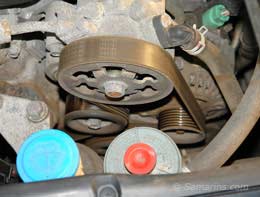 |
| Drive belt |
A loose drive belt can slip causing a loud high-pitch squealing or whistling noise. Usually you can hear it when the engine is just started or when the steering wheel is turned to the limit in either side. It is a fairly simple job to adjust the drive belt tension, so it should not cost you a lot when you take your vehicle to a mechanic. Driving with a loosened drive belt can cause many other problems, e.g. low battery charge, overheating, lack of power-steering assist, etc.
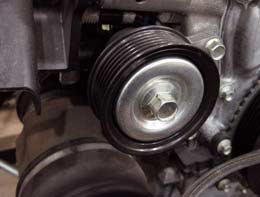 |
| Drive belt idler |
A worn-out drive belt can cause chirping or squeaking noise that is usually more noticeable after driving in the rain. This happens because the water gets on the belt and washes off the dust. This type of noise can also be caused by misalignment of the belt pulleys. Have the drive belt checked, it's not an expensive part to replace.
A worn-out bearing inside the belt idler or tensioner or can cause a whining or buzzing noise. A bad bearing in the alternator also can cause a similar noise.
A timing belt works in a similar way as a drive belt and can produce similar noises. One thing is different, the timing belt can make a whirring or whining noise when it rubs against the belt cover. If the belt is too tight or something is misaligned or not installed properly, it also can produce a similar noise. If after replacing the timing belt you get this type of noise, have the installation of the timing belt rechecked.
Engine noises
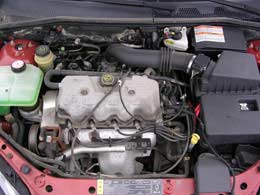 |
| Car engine |
An engine has a lot of moving and rotating parts and it can produce a variety of noises. Most of the internal 'mechanical' noises in the engine are usually caused by lack of lubrication, so checking engine oil should be the first thing to do with any internal engine noise. Here are few common noises:
A vacuum leak can cause a hissing noise that is noticeable at idle. Typically a vacuum leak can also cause the engine to run rough at idle or the engine RPM to be higher than normal. Look for disconnected or cracked vacuum lines or other sources of a vacuum leak.
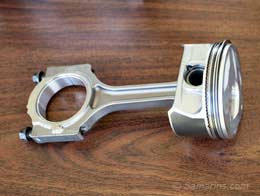 |
| Piston with a connection rod |
The pinging or high-pitch metal knocking noise that is more pronounced under acceleration, especially when the engine is hot or under heavy load, could be caused by a detonation in the cylinders. The detonation, or as it's commonly known, 'spark knock', could happen for many reasons. Often using the fuel with lower than specified octane rating could cause the engine pinging or detonation. The excessive carbon build-up in the combustion chambers or too advanced ignition timing can also cause detonation in the cylinders. Sometimes when the engine runs too lean (more air less fuel) it also can produce a detonation knock, because the lean air-fuel mixture increases the temperature in the combustion chambers. A clogged catalytic converter can also cause the detonation or pinging. If your engine makes this type of noise, have the issue diagnosed before it can lead to more problems. Driving with pinging engine can cause many serious engine problems including blown head gaskets, burnt valves and broken or burned pistons. See the photo.
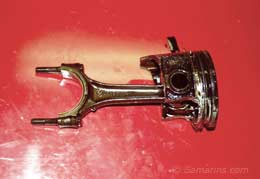 |
| Pistons can break as a result of detonation |
A tapping noise that is coming from the top of a OHC or DOHC engine is often caused by lack of the oil pressure or worn out or out-of-adjustment valve train components. Again, check the engine oil level first. Sticking hydraulic lifters, which is a common problem in older OHV V6 and V8 engines, could also be the source of tapping noise. Some engine additives can help to free the lifters and get rid of the tapping noise.
The piston slap can cause a knocking noise, especially when the engine is started cold. It happens when the pistons are not perfectly tight in the cylinders. When the pistons are pushed up and down, the piston skirt 'slaps' against the cylinder walls. It's a fairly common issue in many cars. Sometimes an engine can run for a very long time with the piston slap noise without it causing any other issues. Sometimes an engine may require an overhaul to repair the issue.
Excessive wear in the crankshaft main bearings can produce a heavy knocking or thumping coming from the bottom of the engine. Sometimes, the main bearing noise can go away when the engine is revved. Sometimes it can be more pronounced when the engine is decelerating.
The connection rod bearing noise also sounds like heavy knocking coming from the engine block. Typically the connection road bearing noise gets louder when the engine is accelerated. The crankshaft bearings are lubricated by engine oil and most of the time, problems with crankshaft main bearings or connection rod bearings are caused by lack of lubrication. It could be a result of low oil level, clogged oil pick-up screen, low oil pressure, poor quality oil, lack of oil changes etc. Both, the connection rod and crankshaft main bearing knock typically requires a complete overhaul of the engine.
Exhaust noises
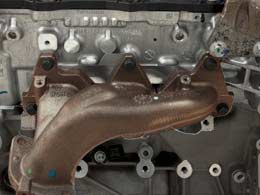 | |||
| Exhaust manifold |
A leaking exhaust manifold can cause a ticking or tapping noise, which is typically louder when the engine is started; the noise could also be accompanied by the exhaust smell from the engine area. Usually this type of noise disappears or quiets down after the engine runs for a few seconds. The exhaust manifold leaks are usually caused by broken manifold studs or cracks in the exhaust manifold.
An exhaust heat shields are the common source of metallic rattle with the engine running. Usually the rattling noise comes from underneath the car and intensifies at a certain engine RPM. This type of noises is usually easy to repair: the loose heat shields are typically secured with worm gear clamps.
Steering and suspension noises
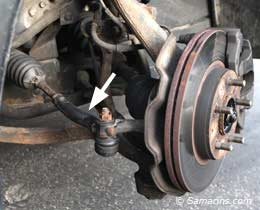 | |
| Outer tie rod end in a front-wheel drive car |
Suspension and steering noises also need to be checked out as soon as possible to be safe. When a suspension component, such as a tie rod end or a ball joint is badly worn, it can separate, sometimes even causing the vehicle to lose control. If you hear a knocking or other noise from the steering or suspension, have it checked out. Here are few examples of the typical suspension and steering noises. Of course, there could be a lot more problems in the suspension and steering that can cause various noises. Any noise should be properly diagnosed.
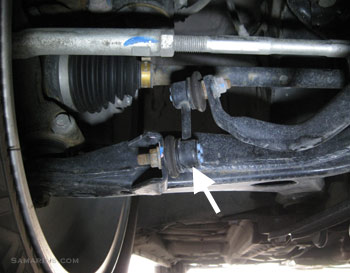 | |
| Stabilizer bar link |
A bad tie rod end usually causes a rattling or knocking noise from the front end when driving slow over small bumps or rough road. After a bad tie rod end is replaced, the wheel alignment procedure must be performed.
A stabilizer bar link can cause a similar type of noise. It may sound as a not very loud knocking when driving slow over small bumps. Worn out stabilizer bar bushings also can cause a similar noise. Either part is not very expensive to replace.
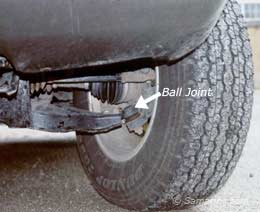 |
| Lower ball joint |
A bad ball joint can cause a clunking or knocking noise coming from the front suspension. Depending on the design, a vehicle may have one, two, three or even four ball joints in one side of the front suspension. Sometimes, a ball joint comes as an assembly with a control arm. After the control arm assembly or a ball joint is replaced, the wheel alignment procedure usually needs to be performed.
A bad upper strut mount bearing could cause a clunking or popping noise coming from the front end while turning the steering, even when the car is stationary. It may feel like something jams and then releases when you turn the steering.
A bad steering shaft joint or lack of lubrication in the intermediate shaft splines in the steering can cause a clunk in the steering column while turning. An excessive wear in the steering rack can also cause similar noises. The repair depends on the defective part.
Low power steering fluid level or air present in the hydraulic power steering system can cause loud moaning, buzzing or whining noise coming from under the hood when turning. The fix is to check the power steering system for leaks and repair if needed, add power steering fluid and bleed the power steering fluid system.
Drivetrain noises
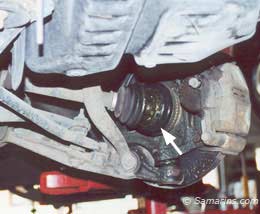 | |
| Broken CV joint boot. |
A bad front Constant Velocity joint or CV joint will typically produce a clicking or popping noise when driving through turns, especially with acceleration. Usually the CV joint goes bad after the CV joint boot is damaged (in the photo). In most cases, a whole drive shaft will need to be replaced and it could cost a few hundred dollars. Read more about CV joints
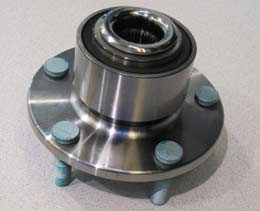 |
| Front wheel bearing. |
A bad wheel bearing causes a humming or growling noise that gets worse with speed. It usually gets quite loud when driving on a highway. It's not always to diagnose a noisy wheel bearing, but here is a tip: the wheel bearing humming noise in most cases gets louder when turning to one side and quiets down a bit, when turning to another side. Replacing a wheel bearing is a few hundred dollar repair. Read more about the wheel bearing problems.
A deteriorated oil in a limited slip differential could cause a clattering or chattering noise coming from the rear end during turns. For example, Honda CR-V is known to have this issue. A new oil of the proper grade usually can fix the noise.
A problem with a rear differential can cause a humming or growling noise from the rear end that gets worse with the speed. Usually the rear differential will need to be rebuilt or replaced.
Tire noises
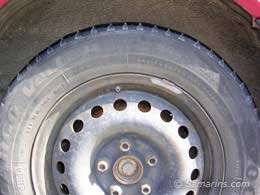 |
| Cupped tire |
A cupped tire can produce a loud ramble or a growling noise that may sound like a bad wheel bearing. If you click the photo to see the larger image, you can see that the tire is not rounded along the tread. Its wear pattern has alternating flat and elevated spots. It's easy to feel it with your hand, moving it around the tread. Obviously this tire won't be quiet, especially at higher speeds.
No comments:
Post a Comment